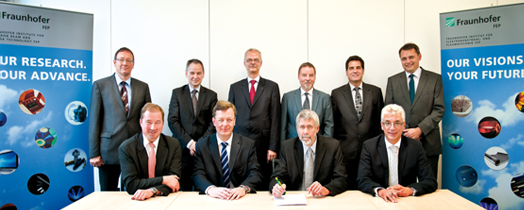06 | 2011 – Cooperative agreement marks the start for further development of eco-friendly seed treatment using electrons
A cooperative agreement was signed on November 24th, by the directors of Getreide AG and BayWa AG, the managing director of Röber Institut GmbH, and the director of the Fraunhofer Institute for Electron Beam and Plasma Technology FEP in Dresden for a further joint development of seed treatment processes using low energy electrons. This group of seed treatment companies, a plant manufacturer, and a research institute aims to advance the eco-friendly process to a new level and to establish it in the commercial marketplace.
Seed treatment using electrons has been used on a large scale for many years by BayWa AG and Getreide AG. In the last years, more than 200,000 hectares of cereal crops are cultivated in Germany using electron-treated seed.
This year Getreide AG and BayWa AG acquired the Wesenitz pilot plant. These companies are the first licensees of the process developed by the Fraunhofer FEP. In collaboration with Röber Institut GmbH, the plant manufacturer, the aim is to adapt the technology further to the requirements of the marketplace. The extensive practical experience gained over recent years will be advantageous here. The new developments aim to make the plant more versatile regarding its size and throughput. In addition, the aim is also to adapt the process for other agricultural crops and vegetable seed.
Seed treatment with electrons is an effective and reliable method for freeing seeds of seed-borne pathogens (fungi, bacteria, viruses). Using a special equipment the electrons only act on the surface and inside the seed coat. The ability of the seeds to germinate is thus not impaired and is at least equivalent to the ability of chemically dressed seeds to germinate. The physical process, which has been recommended many times for organic farming, has a number of advantages for both users and the environment: Excess seed can be used as animal feed, harmful organisms cannot develop any resistance to this process, and no chemical agents are employed. Furthermore, the avoidance of dust from dressing processes, the improved flow properties of the seed, and the faster field emergence are deemed to be positive by users.
Seed treatment using electrons has been used on a large scale for many years by BayWa AG and Getreide AG. In the last years, more than 200,000 hectares of cereal crops are cultivated in Germany using electron-treated seed.
This year Getreide AG and BayWa AG acquired the Wesenitz pilot plant. These companies are the first licensees of the process developed by the Fraunhofer FEP. In collaboration with Röber Institut GmbH, the plant manufacturer, the aim is to adapt the technology further to the requirements of the marketplace. The extensive practical experience gained over recent years will be advantageous here. The new developments aim to make the plant more versatile regarding its size and throughput. In addition, the aim is also to adapt the process for other agricultural crops and vegetable seed.
Seed treatment with electrons is an effective and reliable method for freeing seeds of seed-borne pathogens (fungi, bacteria, viruses). Using a special equipment the electrons only act on the surface and inside the seed coat. The ability of the seeds to germinate is thus not impaired and is at least equivalent to the ability of chemically dressed seeds to germinate. The physical process, which has been recommended many times for organic farming, has a number of advantages for both users and the environment: Excess seed can be used as animal feed, harmful organisms cannot develop any resistance to this process, and no chemical agents are employed. Furthermore, the avoidance of dust from dressing processes, the improved flow properties of the seed, and the faster field emergence are deemed to be positive by users.
 Fraunhofer Institute for Electron Beam
Fraunhofer Institute for Electron Beam